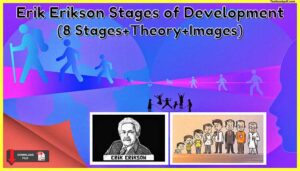Erik Erikson Stages of Development (8 Stages+Theory+Images) Free Pdf Download
We’re going to talk about Erik Erikson Stages of Development (8 Stages+Theory+Images) Free Pdf Download and his theory called the Psychosocial Theory of Development, he came up with the eight stages of man.
About Erik Erikson
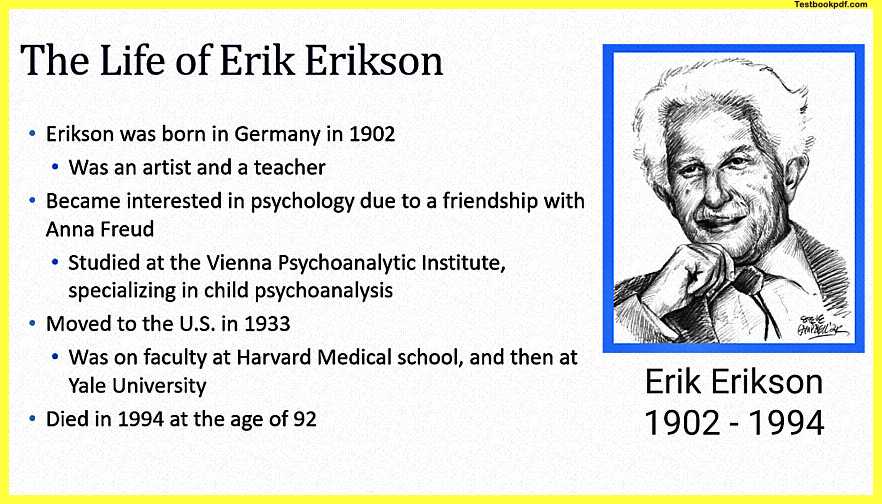
So Erikson was born in Germany in 1902, he was an artist and a teacher and he was friends with Anna Freud, Sigmund Freud’s daughter. And so he became interested in psychology due to his friendship with her so he started studying at the Vienna institute in child psychoanalysis and he moved to the U.S. in 1933. He also died in 1994 so not too long ago, at the age of 92.
So he came up with Psychosocial Development, and he believed that he understood how children developed and he kind of created eight stages of development now. It and his theory include the entire life span.
Freud had stages that he believed in and he didn’t necessarily believe in those stages that Freud came up with. In conversations with Anna, he kind of talked about how he could improve upon Sigmund Freud’s stages, and based on his dealings with children and how what he saw he created his own. So he believed that there is a task that must be accomplished at each stage and that the successful resolution of each stage affects the next stage. Freud also believed that as well and so he kind of hung on to that. He did take that part with his stages.
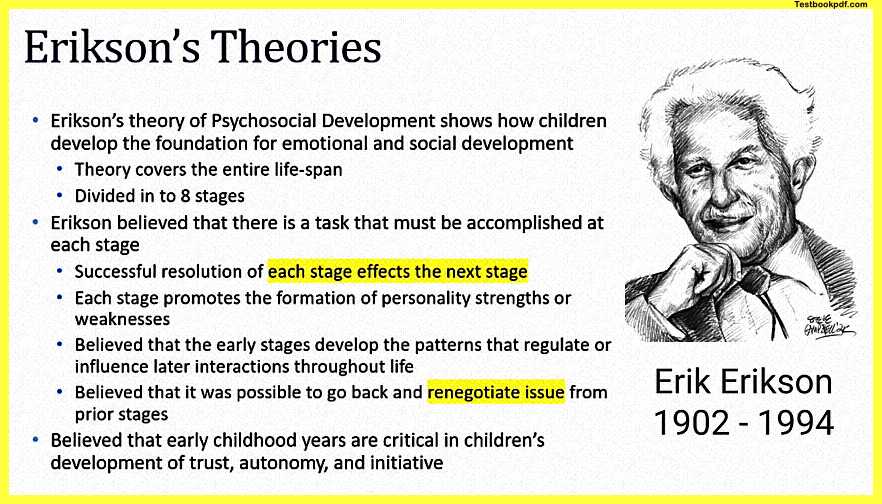
He believes that each stage promotes the formation of personality strengths or weaknesses and he believes that it was possible to go back and renegotiate issues from prior stages. There was actually quite a big business in the 1970s about Erikson and going back into the womb. There were a lot of Psychoanalysis that would have adults try and go back and it sounds really wacky but they would try and go back into the womb and kind of negotiate some of these stages and give them what the therapist would give the people what they thought they needed, what they were missing from each of the stages from their parents at that age. And there was actually one time there was a woman that actually died because they created this womb and it was made out of fabric and it was I don’t know people visited this room that had this womb and it actually suffocated her. So don’t do that at home people or at your therapist’s office. Jokes apart.
Erik Erikson Stages of Development: 8 Stages of Human Development
One of the most well-known theories of personality is Erik Erikson’s theory of psychosocial development, which he developed as a German-American developmental psychologist and psychoanalyst. The hypothesis is unique from many others since it takes into account how people evolve from conception to death. The person has a conflict that marks a turning point in their growth at each level. The psychosocial quality corresponding to that stage of development can be developed once the dispute has been successfully addressed.
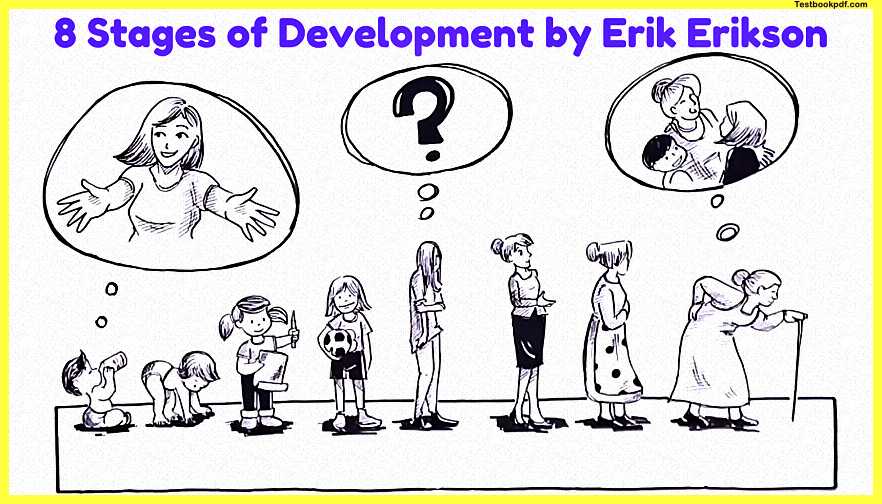
However, if they are unable to resolve these disagreements amicably, they might not acquire the crucial abilities required for a strong sense of self. Erikson also held the view that behaviors and activities are motivated by a sense of competence. Erikson’s theory has stages that each focus on developing competence in a certain aspect of life. The person will experience a sense of mastery, also known as ego strength or ego quality if the stage is managed properly. Poor stage management will leave the person feeling insufficient in that area of development as they exit the stage.
Erik Erikson Stage 1: Trust Versus Mistrust
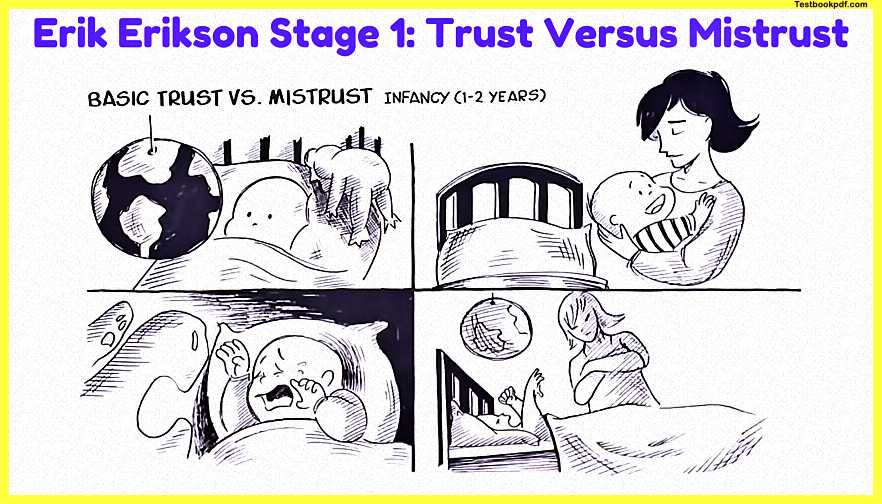
Trust versus mistrust is the earliest psychosocial stage that occurs during the first year or so of a child’s life. During this critical phase of development, an infant is utterly dependent upon his or her caregivers. When parents or caregivers respond to a child’s needs in a consistent and caring manner, the child then learns to trust the world and the people around him. Youngsters will learn that they cannot rely on or trust the adults in their lives if a caregiver does not provide them with enough attention and love. A youngster will feel safe and secure in the world if they are able to properly create trust. Children who are under the care of caregivers may feel distrusted if they are inconsistent, emotionally unavailable, or rejected.
Lack of trust will lead to fear and the conviction that life is unpredictable and inconsistent. No child will ever feel 100% certain or 100% uncertain. Erikson thought that achieving a balance between the two conflicting sides was the key to effective development. Children then develop hope, which Erikson defined as an openness to experience tempered by a certain level of caution that danger may be there. Later studies by experts like John Bowlby and Mary Ainsworth showed how crucial trust is in developing secure bonds in both childhood and adulthood.
Erik Erikson Stage 2: Autonomy Versus Shame and Doubt
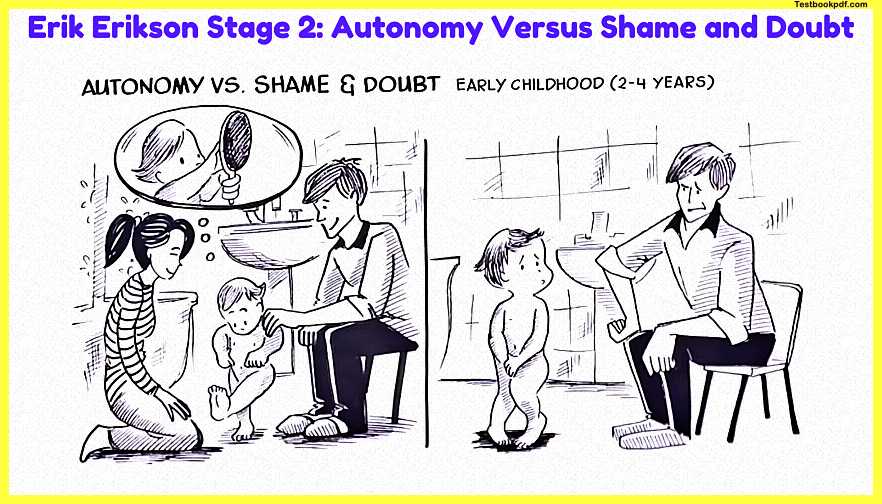
The struggle between autonomy and shame or uncertainty is present in the second psychosocial stage. Developing a larger sense of personal control is more crucial when the child approaches the toddler years. Children are just beginning to gain a little independence at this stage of development. They are beginning to take simple actions on their own and form straightforward preferences. Parents and other adults who care for children can support children’s feelings of autonomy by giving them the freedom to choose and take charge. Children have a stronger sense of independence as they complete tasks like picking out foods, learning how to use the toilet, and selecting toys.
The main idea of this stage is that kids need to gain a sense of independence and personal control over their physical abilities. The development of this sense of independence in youngsters is greatly assisted by potty training. Children who struggle and are humiliated for their mistakes could lose their sense of self-control. During this phase of mental development, accomplishment leads to sentiments of autonomy; failure, feelings of guilt, and uncertainty. Erikson held the view that children may behave with intention, within reason and boundaries, if they have found a balance between autonomy and guilt and uncertainty.
Erik Erikson Stage 3: Initiative Versus Guilt
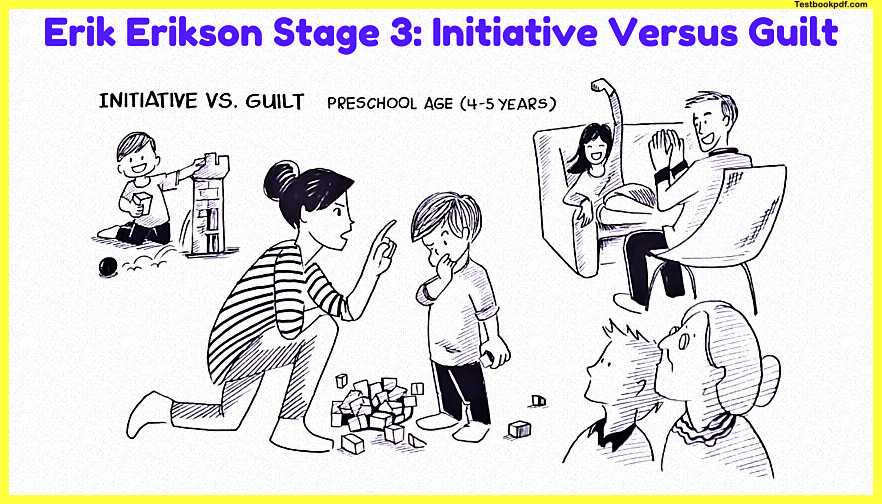
The third psychological stage, which takes place between the ages of three and five, is initiative vs. guilt. In this stage, developing one’s own feelings about the initiative is the main goal. Children who are allowed and encouraged to engage in self-directed play emerge with a strong sense of initiative, whereas those who are discouraged may begin to feel guilty about their self-initiated activities.
The third stage of psychosocial development’s main topic is that kids need to start establishing their authority over their surroundings. A sense of purpose results from success in this stage. Children who try to exercise too much control get criticism, which causes them to feel guilty. The ego attribute known as purpose manifests when the ideal ratio of independent initiative and cooperation is reached.
Erik Erikson Stage 4: Industry Versus Inferiority
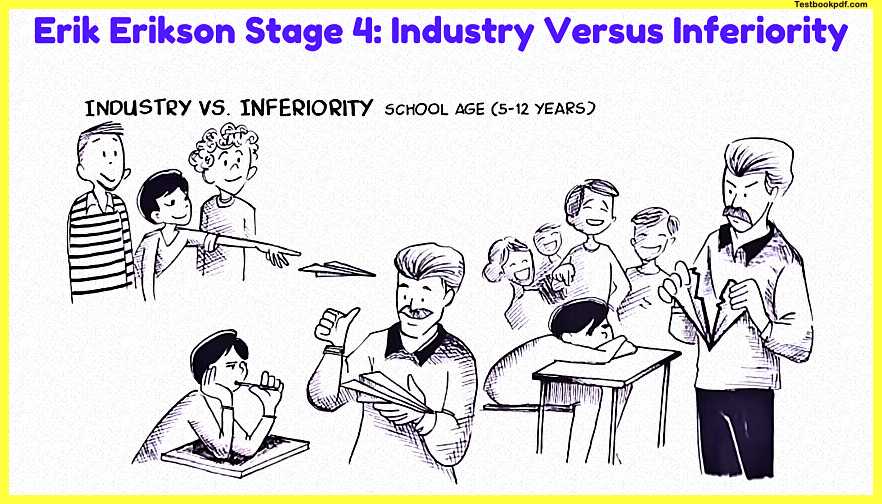
Children begin the psychological stage known as industry versus inferiority in middle childhood between the ages of approximately six and eleven. Children start to feel pleasure and success in their work and talents when they participate in social interactions with friends and intellectual activities at school. Children who get encouragement and praise grow to feel competent. Discouragement leaves those who experience it with a feeling of inferiority. At this point in their psychosocial development, children who are successful in striking a balance develop the strength of competence, which allows them to believe in their capacity to do the tasks put in front of them.
Erik Erikson Stage 5: Identity Versus Confusion
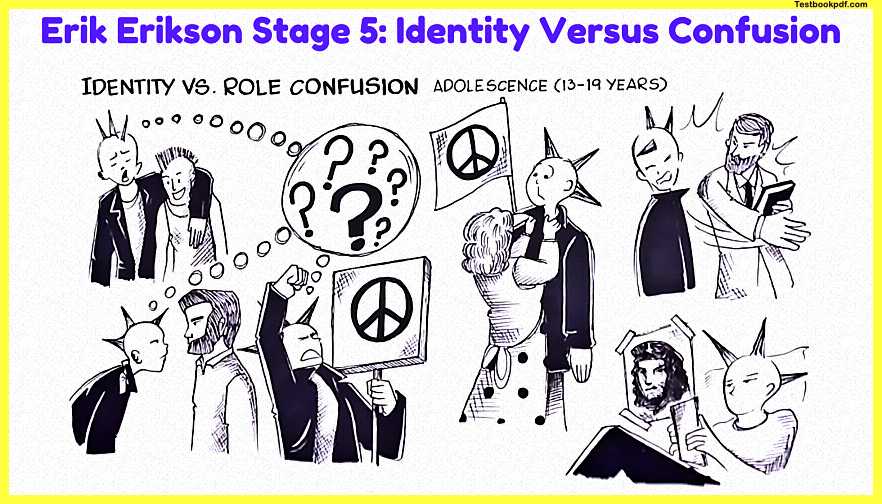
Identity vs. role confusion is the focus of the fifth psychological stage. At this stage of growth, developing a personal identity is crucial. Teenagers experiment with various behaviors, roles, and identities during adolescence. Erikson believed that this stage was particularly significant and that foregrounding a strong identity laid the groundwork for choosing one’s future path in life. Those that do establish a sense of identity feel self-assured, autonomous, and ready to face the future, in contrast to those who stay confused who may feel lost, uncomfortable, and unsure of their place in the world.
What Is “Identity”?
When psychologists discuss identity, they mean all of the precepts, ideals, and principles that influence and direct a person’s conduct. Success in this stage results in fidelity, which Erikson defined as the capacity to adhere to social norms and expectations. Erikson stressed the importance of the development of ego identity, but he also thought that each stage of psychological development was significant.
The conscious sense of self that we acquire from social contact is known as our ego identity, and it becomes a major topic of discussion when we reach the identity versus confusion stage of psychological development. Erikson claimed that as a result of the fresh experiences and knowledge we pick up through our regular encounters with other people, our ego identity is continually changing. We face difficulties as we gain new experiences, which can either aid or hinder the evolution of our identities.
Why is Identity important?
Our personal identity gives each of us an integrated and cohesive sense of self that endures through our lives. Our sense of personal identity is shaped by our experiences and interactions with others, and it is this identity that helps guide our actions, beliefs, and behaviors as we age.
Erik Erikson Stage 6: Intimacy Versus Isolation
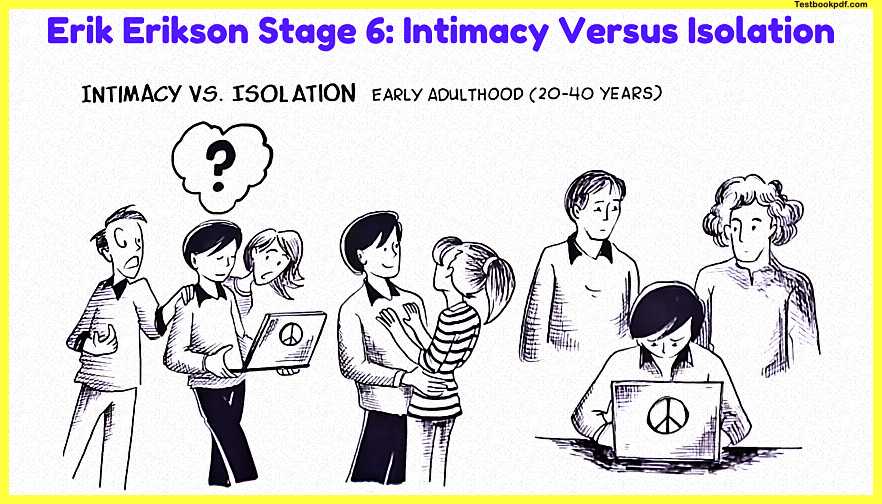
The sixth psychosocial stage emphasizes developing close, loving relationships with others and contrasts intimacy with solitude. The intimacy versus isolation stage, which lasts roughly from the ages of 19 to 40, emphasizes dating, marriage, family, and friendships. People are able to feel love and value intimacy through creating fulfilling loving relationships with other people. Those who are unable to form enduring relationships may feel lonely. Remember that each level builds on the skills you learned in the preceding ones.
Erikson thought that establishing close relationships required a strong sense of one’s own identity. Studies have shown that those with poor self-esteem are more prone to experience emotional isolation, loneliness, and depression as well as to engage in less committed partnerships. The virtue of love is the result of the successful completion of this stage. It is characterized by the capacity to establish enduring, meaningful connections with other individuals.
Erik Erikson Stage 7: Generativity Versus Stagnation
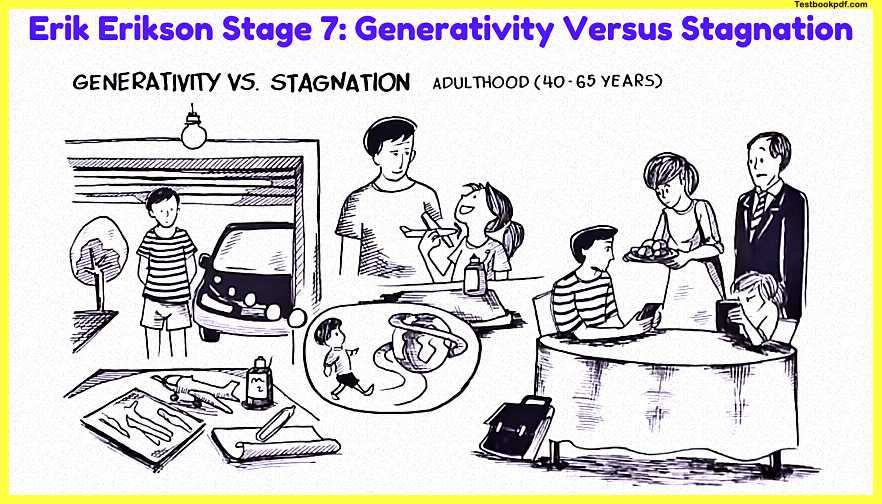
Once adults enter the generativity versus stagnation stage that occurs during middle adulthood, the psychosocial conflict becomes centered on the need to create or nurture things that will outlast the individual. Raising a family, working, and contributing to the community are all ways that people develop a sense of purpose. Those who fail to find ways to contribute may feel disconnected and useless.
Erik Erikson Stage 8: Integrity Versus Despair
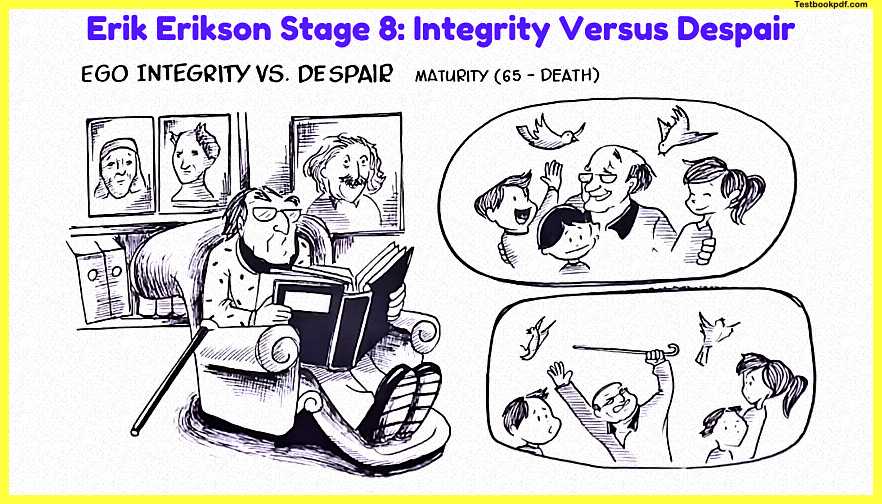
Integrity versus despair, the penultimate psychosocial stage, starts around the age of 65 and lasts till death. The person reflects on his or her life during this time. At this point, the main concern is “Did I live a worthwhile life?” ( “Did I live a meaningful life?” ) Even while confronting death, those who have will experience a sense of fulfillment, wisdom, and calm. Despair may set in for individuals who look back on life with remorse and resentment. Those who fall short at this point may feel as though their life has been a waste and may harbor numerous regrets. The person will experience resentment and hopelessness. Criticism of Psychosocial Theory The hypothesis of Erikson has flaws and is rightfully criticized.
Strength and Weakness of Erickson’s Theory
- What kinds of experiences are necessary to successfully complete each stage?
- How does a person move from one stage to the next?
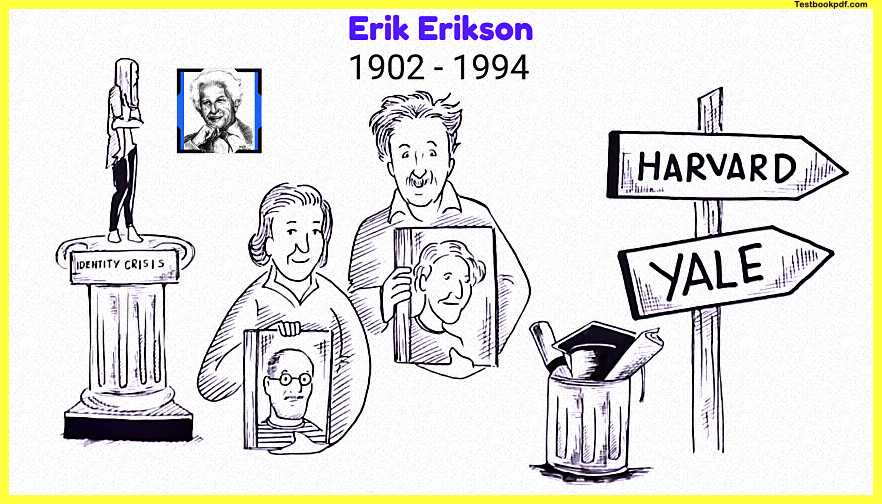
Because it does not sufficiently identify or develop the specific procedures for resolving conflicts and progressing from one stage to the next, the psychosocial theory has a severe flaw. The idea falls short of properly defining the kind of experiences needed at each stage to amicably resolve the problems and go on to the next. One of the benefits of psychosocial theory is that it provides a broad framework from which to view development over the course of the entire lifespan.
Additionally, it enables us to emphasize the social nature of people and the significance of social relationships in shaping development. Erikson’s theories on identity have been supported by research, which has also led to the identification of various identity formation substages. According to several studies, adolescents who have strong personal identities are better equipped to establish close connections in their early adult years. However, according to some studies, identity creation and development last long into adulthood.
If you liked this article share it with your friends.
Read also:
Psychodynamic Approach Pdf Download
